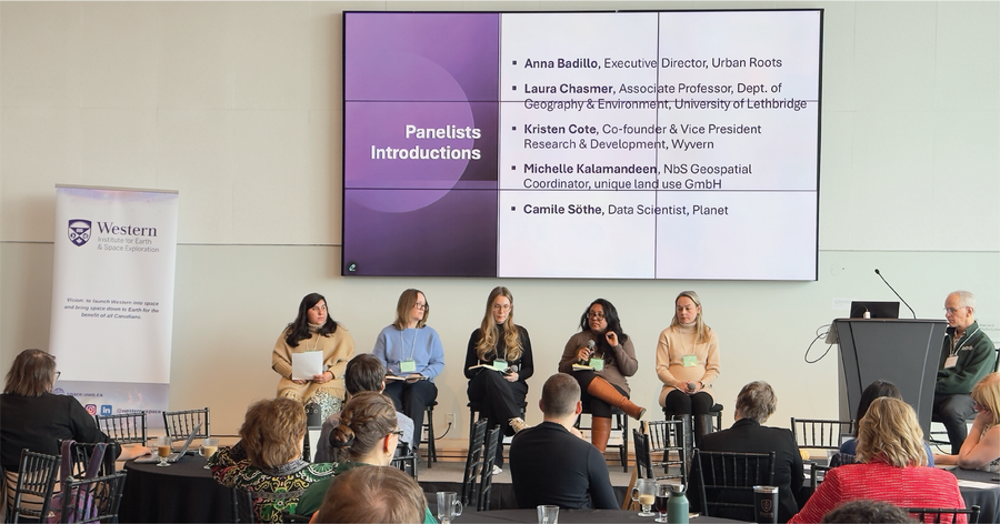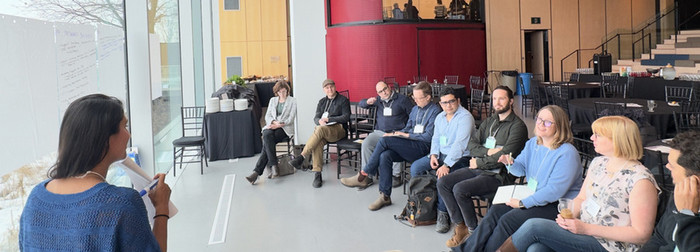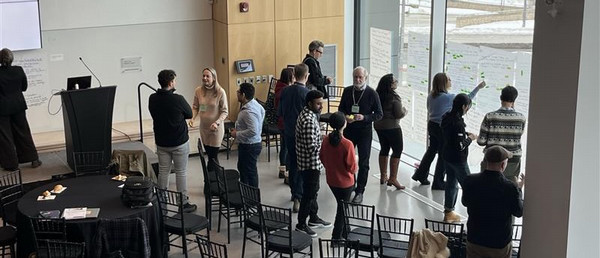RECAP & Western Space Event: Earth Observation of Vegetation

Interdisciplinary Collaboration Inspires Earth Observation (EO) Solutions to Monitor and Sustain Canada’s Vegetation
Canada’s vast forests and agricultural lands are critical for biodiversity, carbon sequestration, and economic stability. With growing threats from deforestation, climate change, wildfires, and land degradation, it is vital to monitor vegetation health and changes at a national level. EO technologies provide real-time, large-scale information that can support local, provincial, and national strategies to sustaining Canada’s ecosystems, but accessing the data, having the right expertise to interpret them, and developing actionable solutions can be challenging.
James Voogt (Professor, Department of Geography and Environment) and Natasha McBean, (Assistant Professor, Department of Geography and Environment) co-chaired a research engagement event hosted by Western Space in partnership with the Research Engagement Collaborative Alliance with Partners (RECAP) team at Western Research. The event brought together nearly 50 experts from diverse sectors within and external to the university to share knowledge about strengths, gaps and opportunities, and to foster relationships across sectors.

The day began with insights from the co-chairs on applications of remote sensing technology followed by a panel of special guests who provided different perspectives on vegetation health monitoring and sustainability: Anna Badillo (Executive Director, Urban Roots), Laura Chasmer (Associate Professor, Department of Geography and Environment, University of Lethbridge), Kristen Cote (Co-founder and Vice President, Research and Development, Wyvern), Michelle Kalamandeen (NbS, Geospatial Coordinator, unique land use GmbH), and Camille Söthe (Data Scientist, Planet). The discussions inspired thoughtful reflection in the audience of how different approaches, gaps, and strengths may intersect with their own role or sector.
Attendees then took the lead by contributing their thoughts in breakout groups that generated over 50 potential research ideas related to agriculture, geography, data science, EO technology, wildfire mitigation, forestry, biology, ecology, policy making, and urban planning. During the priority setting exercise, the group identified six research foci that would benefit from interdisciplinary collaboration, open data initiatives, citizen science projects, advanced modeling and predictive tools, and the integration of sustainable practices:
- Automatic crop stage and disease prevalence detection and forecasting
- High-resolution 3D representation of urban areas
- Early detection techniques for wildfire & tree disease
- Improving fuel grid maps for wildfire prediction
- City of London species diversity, canopy growth and carbon footprint reduction
- Global environmental monitoring network City of London species diversity, canopy growth and carbon footprint reduction
The connections and opportunities generated at this event are a step towards Canada becoming a global leader in EO innovation and creativity for monitoring and sustaining vegetation health, and for the development of partnerships to further the application of solutions.

NEXT STEPS?
RECAP and Western Space will facilitate smaller focused meetings on the six priority research areas to develop research project ideas and to secure necessary funding to advance the work. Please contact our team at western.recap@uwo.ca to indicate your interest in joining future meetings.

